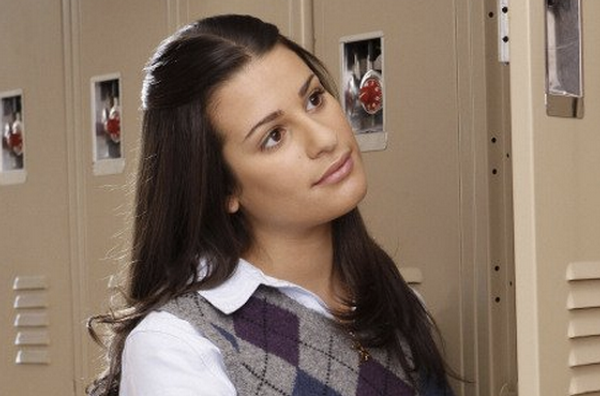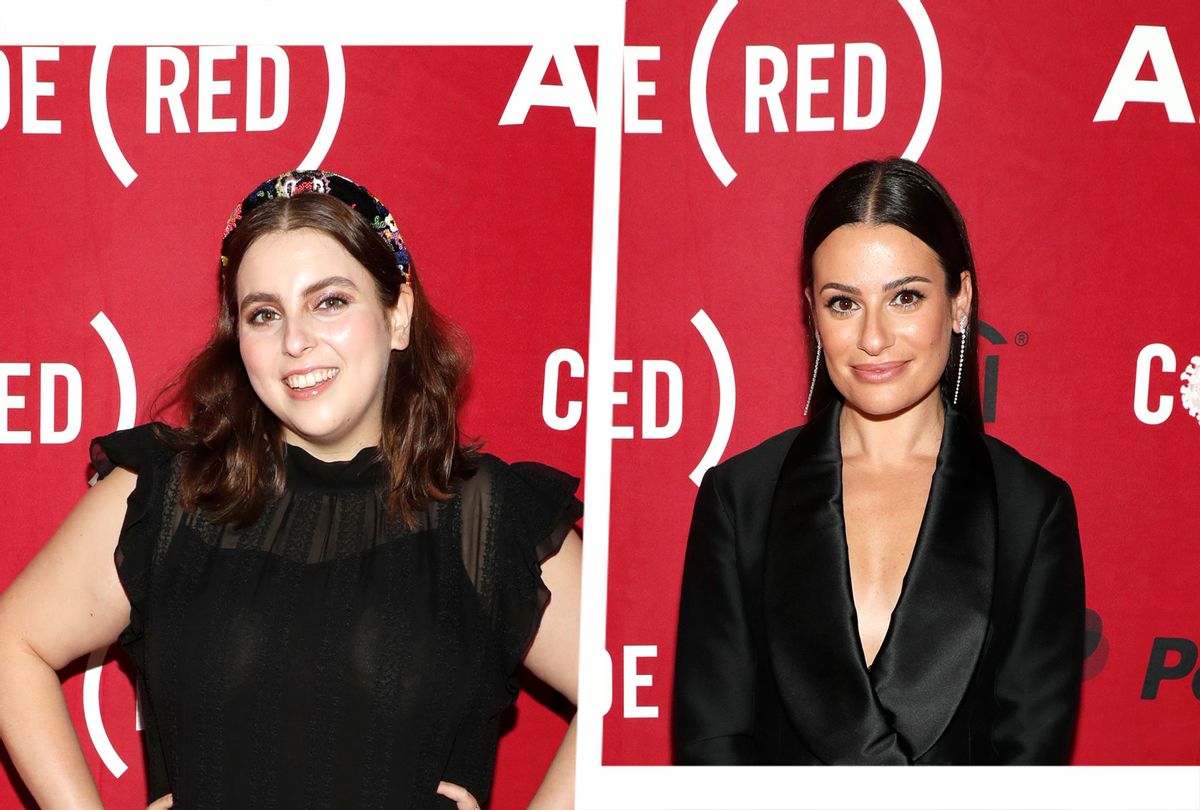At the start of "Funny Girl," the 1964 Broadway musical turned 1968 film, aspiring performer Fanny Brice just can't get a break. It's hard not to see parallels in the current Broadway revival, which has received more time in the media spotlight than usual.
The show's originally cast Fanny Brice, Beanie Feldstein, announced on social media Sunday she was leaving months earlier than intended, citing the production's "decision to take the show in a different direction."
Less than 24 hours later, that direction was revealed: Lea Michele, who was quickly named Feldstein's successor and will join the Broadway cast Sept. 6. Until then, the lead role will be portrayed by understudy Julie Benko, who seems to be starring in a "Funny Girl" type story of her own, with Benko continuing to play the role once a week after Michele steps in. Benko describes herself on her Twitter profile as "the luckiest standby in the world."
RELATED: Why Greta Gerwig's "Lady Bird" is the sort of directorial achievement the Academy always overlooks
Why is there so much drama about this comedy? What happened with Feldstein and why such a fuss over this particular show? Salon breaks down what you need to know about "Funny Girl" and the elaborate casting drama.
The musical backstory
With a score by Jule Styne, lyrics by Bob Merrill, and book by Isobel Lennart, "Funny Girl" tells the semi-true story of actor, comedian and Broadway star Fanny Brice. Born Fania Borach, Brice, the daughter of Jewish Hungarian and Alsatian immigrants, dropped out of school to start performing burlesque. She found fame on the stage, and later in radio and TV. She also had a series of difficult marriages.
"Funny Girl" in particular dramatizes her marriage to Nicky Arnstein, who was a gambler and professional con artist with multiple aliases. Convicted of "swindling," he served time in Sing-Sing. Brice visited Arnstein, who was married to someone else at the time, in prison every week. Upon his release, he got a divorce and then married Brice. They had two children. About a decade later, Arnstein served time in Leavenworth, and Brice divorced him when he was released.
As a dramatization, "Funny Girl" takes some liberties with Arnstein (and his crimes) as it does with Brice and their relationship. Omar Sharif played Arnstein in the film version. And Barbra Streisand originated the role of Fanny Brice on Broadway and in the movie.
It was difficult to picture the show without its first star, who shone so brightly, the faults of the rest of the story could be seen in glaring relief, like a spotlight illuminating the dusty backstage.
The Babs effect
Streisand was already famous by the time "Funny Girl" opened. She had gotten her start in New York City nightclubs and comedy plays. While still a teenager, she made her Broadway debut with "I Can Get It for You Wholesale," for which she received a Tony Award nomination.
In some ways, "Funny Girl" seemed to parallel Streisand's own career beginnings. While Brice dropped out of high school, Streisand graduated early at age 16 and lived on her own as she tried to make it as a performer. Streisand changed her name (dropping one of the "a's), repeatedly dealt with negative comments about her looks and was advised to get a nose job. She refused.
In "Funny Girl," Brice's character is told she's not pretty enough to be on stage, certainly not as the star. She's nearly fired because her legs are too skinny, and once she lands a major role — as a Ziegfeld girl, no less — she almost sabotages it by turning the highly glamorous part into a joke. She's so used to people laughing at her, she can't bear to be the lovely center of attention if it isn't a punchline (or a throw pillow making her into a very pregnant bride).
Streisand won an Academy Award for Best Actress for the film version of "Funny Girl," after being nominated for a Tony for the stage musical. Except for a 2016 West End production, there have been few notable revivals. It was difficult to picture the show without its first star, who shone so brightly, the faults of the rest of the story could be seen in glaring relief, like a spotlight illuminating the dusty backstage.
Other critics were not as kind. The Guardian wrote Feldstein "struggled."
As Roger Egbert wrote in his review of the film: "The trouble with "Funny Girl" is almost everything except Barbra Streisand. She is magnificent . . . It is impossible to praise Miss Streisand too highly." The New York Times wrote in their 1968 review: "When she is singing –in a marvelous scene on roller skates – when she throws a line away, or shrugs, or looks funny or sad, she has a power, gentleness and intensity that rather knocks all the props and sets and camera angles on their ear."
The revival's "not stupendous" casting
About the new Broadway revival, the Times was less enthusiastic, calling it "mild" and writing "without a stupendous Fanny to thrill and distract, the musical's manifold faults become painfully evident." The review calls Feldstein, who stepped into Brice's shoes: "not stupendous . . . She's good. She's funny enough in places."
Other critics were not as kind. The Guardian wrote Feldstein "struggled" while Variety called the production "uninspired," singling out Feldstein's performance as "a wide-eyed woman-child, at turns stubborn, awkward and silly. Knowingly precocious, Feldstein relies on broad face-making rather than a more nuanced comic skillset."
Feldstein is best known for her film and TV work, starring in Olivia Wilde's directional debut, the 2017 film "Booksmart," for which the actor won a Golden Globe nomination, and in Greta Gerwig's "Lady Bird." She had a recurring role in the TV adaptation of "What We Do in the Shadows," which garnered rave reviews and starred as Monica Lewinsky in FX's "American Crime Story: Impeachment." She made her Broadway debut in 2017's "Hello Dolly!" revival, which also received a glowing response, and is slated to appear in Richard Linklater's movie adaptation of Stephen Sondheim's "Merrily We Roll Along."
Feldstein's replacement, Michele, is best known for starring on "Glee," the TV musical comedy that ran from 2009-2015 and saw her rack up award nominations from two Golden Globe nominations to three Teen Choice nods. She started her career as a child actor, appearing in Broadway productions of "Les Misérables" and "Ragtime" before originating the role of Wendla in "Spring Awakening." She's been very vocal about wanting to play Fanny Brice, and some see her casting as a course correction of sorts.
Michele replacing Feldstein comes at a time when Broadway is still struggling after going dark during early COVID, hits that keep coming as the pandemic keeps raging.
Alas, a reunion with former "Glee" co-stars Michele and Jane Lynch ("The Marvelous Mrs. Maisel") is not to be. Lynch is currently portraying Brice's mother in the production but will exit before Michele takes over. Lynch will be replaced by Tovah Feldshuh, who starred in the original Broadway production of "Yentl," and recently appeared in the CW's "Crazy Ex-Girlfriend." Lynch and Michele might have overlapped in the production, except for the new schedules. Lynch was previously scheduled to leave the show after September, but is now leaving weeks earlier.
 Lea Michele in "Glee" Michele replacing Feldstein comes at a time when Broadway is still struggling after going dark during early COVID, hits that keep coming as the pandemic keeps raging. A new variant is hitting. Meanwhile, Broadway theatres have dropped their vaccine and mask requirements (a New York Times review of the new revival of "Into the Woods" commented on "the masks not worn at all" in the audience of a musical about, in part, helping each other ). In the 2021-2022 season, Broadway attendance and revenue was less than half of pre-pandemic numbers. As always, old shows keep the lights on. Along with "Into the Woods," other Broadway revivals include "The Music Man," "Chicago" and "Company."
Lea Michele in "Glee" Michele replacing Feldstein comes at a time when Broadway is still struggling after going dark during early COVID, hits that keep coming as the pandemic keeps raging. A new variant is hitting. Meanwhile, Broadway theatres have dropped their vaccine and mask requirements (a New York Times review of the new revival of "Into the Woods" commented on "the masks not worn at all" in the audience of a musical about, in part, helping each other ). In the 2021-2022 season, Broadway attendance and revenue was less than half of pre-pandemic numbers. As always, old shows keep the lights on. Along with "Into the Woods," other Broadway revivals include "The Music Man," "Chicago" and "Company."
Want a daily wrap-up of all the news and commentary Salon has to offer? Subscribe to our morning newsletter, Crash Course.
It's unclear if a "Funny Girl" revival with Michele at the helm will draw the crowds in, if she has the Streisand touch that critics accused Feldstein of lacking, or if Michele is able to make the coveted role her own. In a statement on Instagram, Michele wrote "A dream come true is an understatement," echoing Feldstein's statement about her departure: "Playing Fanny Brice on Broadway has been a lifelong dream of mine, and doing so for the last few months has been a great joy and true honor."
As Fanny Brice herself says in the film: "For once, I didn't say too much, I didn't say too little. I said just what I said and then walked."
More funny girl stories



Shares